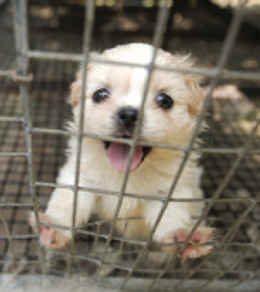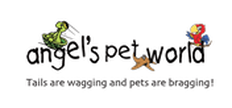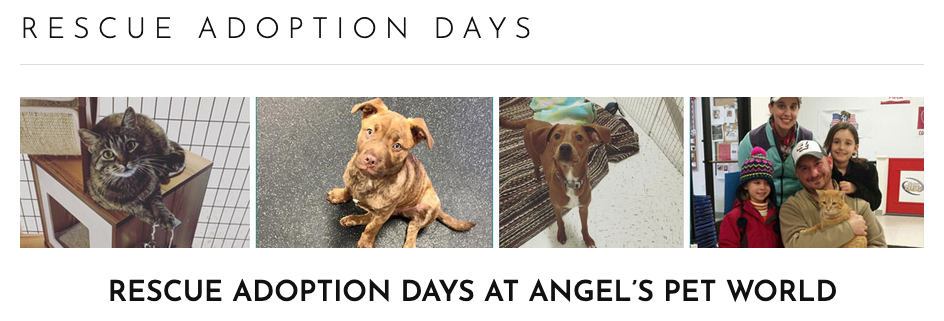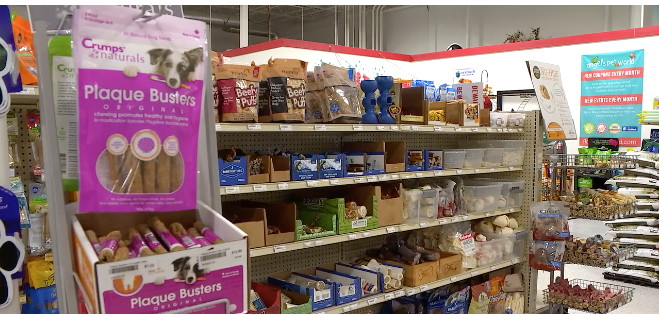WHAT IS THE 'HUMANE PET STORE MODEL'?

Communities in the United States, Canada and Europe have recognized the problem of breeding facilities that mass produce puppies and kittens who are sold through pet stores to unsuspecting consumers.
To address this problem, cities in Minnesota and across the United States have passed ordinances that provide a "humane pet store model." This model focuses on two core concepts:
The humane pet store model is business-friendly, allowing pet stores to sell quality products and services and host pet adoption events at their store in conjunction with area shelters and rescues. These adoption events not only help decrease pet overpopulation and homelessness, they also encourage consumers who adopt an animal to purchase the products and services they need from the pet store.
The model does not impose regulations and inspections, therefore, it is not a costly burden for the city.
To address this problem, cities in Minnesota and across the United States have passed ordinances that provide a "humane pet store model." This model focuses on two core concepts:
- Prohibit pet stores from selling dogs and cats acquired from industrial breeding facilities;
- Allowing pet stores to host adoption events with animal shelters and rescues.
The humane pet store model is business-friendly, allowing pet stores to sell quality products and services and host pet adoption events at their store in conjunction with area shelters and rescues. These adoption events not only help decrease pet overpopulation and homelessness, they also encourage consumers who adopt an animal to purchase the products and services they need from the pet store.
The model does not impose regulations and inspections, therefore, it is not a costly burden for the city.
Example of language for proposed ordinance
The specific language for the ordinance has not yet been introduced in Blaine. Example of proposed language, as passed in other cities and suggested for Blaine, can be found here: Proposed language.
The topic for a Humane Pet Store Ordinance has been presented to the Blaine City Council. Let your voice be heard.
The topic for a Humane Pet Store Ordinance has been presented to the Blaine City Council. Let your voice be heard.
Minnesota Cities with Humane Ordinance

Six cities in Minnesota (Roseville, Eden Prairie, St. Paul, Carver, Cloquet, and Minneapolis) and over 480 localities through the United States plus seven states (California, Maryland, Maine, Washington, Illinois, New York, and Oregon) have already passed similar legislation to address the problem of puppy mill puppies and kittens sold though pet stores. Communities in BC Canada have also banned dog sales at pet stores and numerous countries throughout Europe do not allow live sales through pet stores.
Seven of Blaine's eight pet stores have already adopted a humane business model where they do not sell puppies or kittens; many partner with local animal rescues and shelters to host adoption events.
Seven of Blaine's eight pet stores have already adopted a humane business model where they do not sell puppies or kittens; many partner with local animal rescues and shelters to host adoption events.
WHY GOING HUMANE WORKS
THE PURPOSE: WHY THE ORDINANCE IS NEEDED.
The purpose of the ordinance is to respond to concerns of the community about the humane treatment of animals in a way that addresses the systemic nature of the problem: Where do the puppies and kittens in pet stores come from? Where are they bred? What are the conditions?
The humane pet store model will:
The humane pet store model will:
- protect animals from neglect and cruelty — in pet stores and in mass (industrial) breeding facilities where dogs and cats are acquired;
- protect consumers from economic and emotional harm when a sickly animal is purchased or when they unknowingly support a cruel industry;
- encourage the public to adopt homeless animals or seek out responsible breeders;
- lessen the burden on law enforcement and other authorities who must repeatedly respond to cruelty complaints and noncompliant conditions;
- uphold the values of residents and promote the city as a humane community.
PET STORE EXAMPLE: MAKING THE TRANSITION. A SUCCESS!

Angel Duratti, owner of Angel's Pet World in Wisconsin, transitioned to a humane pet store business model in 2010 — which has been a huge success! For years, she had purchased puppies from a large commercial dog breeder in Pipestone County (still operating). This breeder also acted as a broker and bought puppies from other breeders to sell to pet stores. Duratti no longer sells puppies and kittens from commercial breeders and instead works with animal rescue organizations.
|
As told by Angel Duratti, owner of Angel's Pet World:
"For me, the switch was about doing the right thing. So many of the puppies we bought from this Minnesota breeder had health problems, such as kennel cough, giardiasis, coccidian, roundworms, pneumonia, skin issues, ear issues, patellas, parvo, and more. The last litter (10 puppies) I bought from him each had brucellosis, which is a dangerous disease. Every time we received a delivery of puppies we immediately took them to our veterinarian to be examined. Because there were so many health concerns, we also decided to wait ten days before selling any puppies — just in case one of the puppies showed signs of an illness. But even that didn't work. I never knew when I'd get a call from a customer saying "my puppy is sick." I would reimburse consumers for their vet bills, which was expensive. We didn't need to do that legally, but I wanted to. I didn't want to deceive my customers. |
We could return sick puppies to the breeder, but I never did. I didn't want the animal killed. When I would notify the breeder about a health problem, he might discount the price or sometimes just tell my vet to euthanize the animals — which I wouldn't allow.
So I decided we could no longer buy from breeders — and instead go humane, which meant working with rescue groups and holding adoption days at my stores.
Some people ask me how that decision impacted my sales. Puppy sales alone made up about 22% of our sales. But the vet expenses exceeded that amount. Plus, once we joined up with Coco's Heart Dog Rescue and people started hearing that we went humane, we got huge support. Within 2 years, our customer base grew about 70%. People who really care about animals and oppose puppy mills started buying their pet supplies from us. Even my employees were so happy we made the switch.
Going humane has been wonderful and has changed everything. The reward is so much greater. I fully support the humane pet store model."
So I decided we could no longer buy from breeders — and instead go humane, which meant working with rescue groups and holding adoption days at my stores.
Some people ask me how that decision impacted my sales. Puppy sales alone made up about 22% of our sales. But the vet expenses exceeded that amount. Plus, once we joined up with Coco's Heart Dog Rescue and people started hearing that we went humane, we got huge support. Within 2 years, our customer base grew about 70%. People who really care about animals and oppose puppy mills started buying their pet supplies from us. Even my employees were so happy we made the switch.
Going humane has been wonderful and has changed everything. The reward is so much greater. I fully support the humane pet store model."
WHAT ELECTED OFFICIALS ARE SAYING.
"One of the best ways to stop the prevalence of these puppy mills is to significantly reduce the demand
by ending transfer of pets through retail sales outlets. These puppy mill advocates know this is their market and
that is why they protested my efforts to infringe upon this inhumane treatment of dogs and cats."
- Representative Andrew Chesney, 89th District, Illinois
This [humane pet store ordinance] is in fitting with Roseville's values, and current conditions are not."
- Roseville (MN) Council Member Lisa Laliberte, Pioneer Press, February 17, 2017
"While [our city] does not have stores that are selling pets commercially, this is part of a larger effort.
We want to draw statewide and even national attention to this issue so something is done about this issue for good."
- Eden Prairie Mayor Nancy Tyra-Lukens
"We wish to join the movement that shuts down the pipeline going from puppy mills to stores into private homes.
Also, rarely do we get this chance to confront a problem like this...
that has a seemingly fairly easy solution that is also so clearly, ethically and morally the right thing to do."
- Eden Prairie (MN) Council Member Ron Case, who made the motion to amend City Code Chapter 9
"We don't want to be part of the problem. We want to be part of the solution.
We want to make it more difficult to sell puppy mill animals and easier to adopt wonderful animals out of the shelters."
- Los Angeles City Councilman Paul Koretz, as reported by ABC News for Los Angeles
"People buy small animals all the time as an impulse buy, don't know what they're getting into, and animals end up at the shelter."
- Sally Stephen, chairwoman of San Francisco's Commission of Animal Control and Welfare, as told to San Francisco Chronicle
"We don't put anyone out of business. However, it is very reasonable that we prohibit
animals coming into our county that we know are coming from areas that perpetuate the suffering of animals."
- Diane Saube, Animal Care and Control, Palm Beach County, Palm Beach Post, September 9, 2016
"I very much wanted to have this in place. When you buy a dog or cat, it becomes part of your family.
Knowing the background of puppy mills and kitten mills, it seems like a cruel way for them to start their lives."
- Mayor Ann Subrizi, Borough of New Milford, New Jersey, NewJersey.com, September 29, 2016
"More times than not these animals that are coming into the stores are from puppy mills and kitten factories. ...
The suffering is real that they're enduring and we need to put a stop to that and support our shelter adoptions."
- Dr. Shaydo Ahkami, director of shelter veterinary services, Palm Springs, California, News Channel 3 (abc), September 17, 2015
"One of the best ways to stop the prevalence of these puppy mills is to significantly reduce the demand
by ending transfer of pets through retail sales outlets. These puppy mill advocates know this is their market and
that is why they protested my efforts to infringe upon this inhumane treatment of dogs and cats."
- Representative Andrew Chesney, 89th District, Illinois
This [humane pet store ordinance] is in fitting with Roseville's values, and current conditions are not."
- Roseville (MN) Council Member Lisa Laliberte, Pioneer Press, February 17, 2017
"While [our city] does not have stores that are selling pets commercially, this is part of a larger effort.
We want to draw statewide and even national attention to this issue so something is done about this issue for good."
- Eden Prairie Mayor Nancy Tyra-Lukens
"We wish to join the movement that shuts down the pipeline going from puppy mills to stores into private homes.
Also, rarely do we get this chance to confront a problem like this...
that has a seemingly fairly easy solution that is also so clearly, ethically and morally the right thing to do."
- Eden Prairie (MN) Council Member Ron Case, who made the motion to amend City Code Chapter 9
"We don't want to be part of the problem. We want to be part of the solution.
We want to make it more difficult to sell puppy mill animals and easier to adopt wonderful animals out of the shelters."
- Los Angeles City Councilman Paul Koretz, as reported by ABC News for Los Angeles
"People buy small animals all the time as an impulse buy, don't know what they're getting into, and animals end up at the shelter."
- Sally Stephen, chairwoman of San Francisco's Commission of Animal Control and Welfare, as told to San Francisco Chronicle
"We don't put anyone out of business. However, it is very reasonable that we prohibit
animals coming into our county that we know are coming from areas that perpetuate the suffering of animals."
- Diane Saube, Animal Care and Control, Palm Beach County, Palm Beach Post, September 9, 2016
"I very much wanted to have this in place. When you buy a dog or cat, it becomes part of your family.
Knowing the background of puppy mills and kitten mills, it seems like a cruel way for them to start their lives."
- Mayor Ann Subrizi, Borough of New Milford, New Jersey, NewJersey.com, September 29, 2016
"More times than not these animals that are coming into the stores are from puppy mills and kitten factories. ...
The suffering is real that they're enduring and we need to put a stop to that and support our shelter adoptions."
- Dr. Shaydo Ahkami, director of shelter veterinary services, Palm Springs, California, News Channel 3 (abc), September 17, 2015



